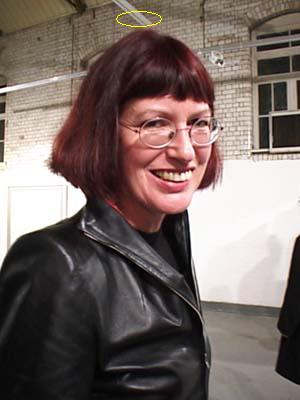 Just where does Saint Janet of Street-Porter get off? Looks like Horsham, to me...
Just where does Saint Janet of Street-Porter get off? Looks like Horsham, to me...From 20th Century Words by John Ayto, 1999:
chattering classes n (1985) a social group consisting of articulate members of the educated middle class, typically seen as holding liberal opinions (notably opposition to the Thatcher government of the 1980s) and given to debating social, political or cultural issues amongst themselves. British colloquial, and usually used with dismissive contempt (generally by someone who might him - or herself be regarded as belonging to the group). Reportedly coined by the journalist Frank Johnson in the early 1980s, and popularised by Alan Watkins in the "Observer".
Back in the 1980s, when the "chattering classes" tag was first applied, those lovely people in their cumfie wumfie homes, complete with Betamax or VHS video recorders and some even with microwave ovens (well beyond the pockets of many of us back then), seemed to be on the side of those of us who called ourselves "working class" (quaint, eh?) and viewed ourselves as being victims of Thatcherism.
As well as chuntering on about a load of insignificant crap, those paragons of virtue were anti-Thatcher, anti-capitalism, anti-cutbacks... caring sharing lovelies, many of whom prided themselves on having been teenagers/twenty-somethings in the 1960s. In those days we didn't bother to mention the 1970s - they were far too recent and far too unpleasant to be crowed over at that point.
"Vote Labour, Vote Labour, Vote Labour, Vote shiny new Lib Dems," chanted the chatterers.
Fast forward to now, and we have a New Labour government which has reduced the health service in England to tatters; is planning controversial education reforms; is making our police and emergency services larger and more unaccountable to the localities they serve; is foisting legislation on us via the West Lothian thingie; is under funding England at every opportunity, and imposing undemocratic regional assemblies on us.
New Labour is obviously very different to Old Labour. It doesn't take a clever clogs to see that. So what do the chattering classes say now?
"Vote Labour, Vote Labour, Vote not-so-new-and-shiny Lib Dems!"
Many of their members still pride themselves on having been trendy hipsters in the 1960s, but nowadays many also pride themselves on having been 60s hippie leftovers or retro 1950s Fonzie clones in the 1970s. The 70s have been rewritten - with the aid of the BBC, of course. Auntie's "I Love The 1970s" series took a grim decade, poured in loads of pop culture from the 1960s and 1980s, and made it better.
Whatever their vintage, the chattering classes think they're rather supah.
So, are their voices raised at the democratic deficit suffered by the people of England under this government? No, sadly not. They haven't the insight to adapt to the situation. Many of them remain loyal to Labour, although the Labour Party they first supported has ceased to exist.
But the chattering classes have spotted some new villains to take the place of the Thatcher mob. Yep, it's you there or me here, flying the Cross of St George flag in support of the England football team or in protest at this government's actions against England. The chattering classes just KNOW that we are racist, moronic thugs. Unsavoury blots on the landscape.
So they have adapted to different times. And now look down their noses at us, the great unwashed. Don't try to protest. They know. They are educated people, idealists, liberal thinkers of the first order.
Some of them write newspaper columns.
What do we do, eh?
Them up there, us down here.
I suppose that's progress.
Oh, Janet Street-Porter, I fly the England flag, I want my country to be acknowledged, I want a fair deal for its people. I grovel at your knowledgeable pixie boots for forgiveness. Please explain to me where I am going wrong...
From my viewpoint, the so-called "enlightened" views of you and your ilk, the disparaging comments about "white van man" and the national flag, seem to be powered by nothing more than old fashioned, unenlightened class snobbery...
Now, that surely can't be the case. can it?
This blog is supportive of the aims of the Campaign for an English Parliament, but is in no way connected.
